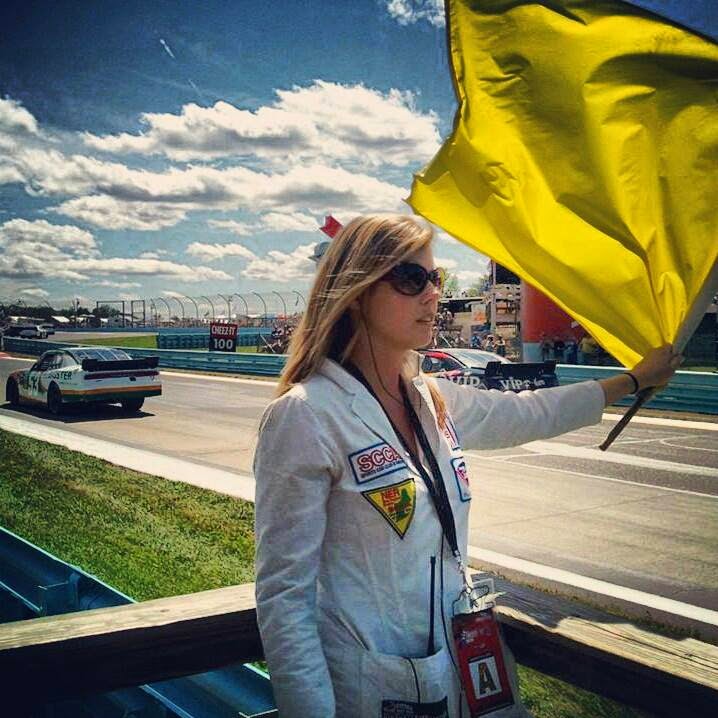Jessie, thanks for taking time to answer a few questions for us. I’m glad we could find a way for you to be part of our show.
About myself, well… I’m a little crazy, I'm terrified of public speaking, I eat a lot of pizza and love being involved in racing. You’ll find me next to the track using my flags and radio to inform drivers and race control about the condition of the racing surface.
2. How did you become interested in racing and “flagging?”
3. What kind of training did you have to go through to become a licensed flagger? Are there different levels of licensing?
Classroom training isn’t required to become an SCCA flagger, but I recommend going to a class if there’s one available.
SCCA offers three levels of licensing for flaggers – regional, divisional, and national. I currently have my regional license and hope to get my divisional license upgrade soon.
4. Take us through a typical day in the life of a flagger at the race track!
A typical day starts with a flag meeting about an hour before cars are on track. Once arriving on station, we check to make sure we have all of our stuff: people, flags, radio, fire bottles, etc. We do a course check on the radio so that race control can verify that the track is clear to release cars. Then the fun starts! We watch, respond, and report regarding track incidents. After ten hours or so, and after we are mentally worn out, we go relax and sometimes enjoy an adult beverage or two.
5. What are the most important things you have to look out for while flagging?
Myself, my fellow flaggers, and the drivers - in that order. We don't have anything to protect us like the drivers do. Anything can happen, we need to expect the unexpected.
6. How dangerous is this position?
7. You are a well-known flagger for major events. Do you see yourself ever doing anything else in the sport or even racing someday?
A career in racing would be amazing. I wish a race team was in need of a BMW Warranty Administrator... and I really hope my boss isn’t reading this.
I do plan on racing again when I can afford another race car.
I do plan on racing again when I can afford another race car.
8. Being that racing is considered a male dominated sport do you feel like the volunteer positions are considered the same? Do you have any problems from male flaggers?
I've never felt that I'm any less important than the male flaggers that I work with. No male flagger has ever made me feel uncomfortable. It’s a really great group of people, no matter which track I go to.
9. Does racing and working with more males than female affect your personal and dating life?
Also, as I’m sure you know, a female can get different attention than a male at the track - or anywhere. I’m pretty oblivious to how a lot of people act towards me, and I assume everyone has good intentions. I'm not sure if being naïve helps or hurts the situation.
10. Have you ever thought about having sponsorships for flaggers because most of the time the flaggers are all volunteers and pay their own travel expenses.
Yes! Main reason - there’s a shortage of flaggers at many tracks. If we can get sponsorship money to flaggers to help cover expenses, then maybe there wouldn’t be a shortage of volunteers.
You might think: that’s ok, the race will happen anyway because they met the minimum number of workers needed to run the race. Right? Well…
Imagine you’re racing. Your car catches on fire and you stop at Turn 6 of whatever track you’re thinking of. Turn 6 is calling for help over the radio and waving a flag, but they are without a “responder” because of the worker shortage. There’s nobody there with an extinguisher waiting to help you. Imagine that other race traffic/cars, stopped or moving make it difficult for emergency vehicles to get on track and to you quickly. You’re sitting there in a burning car for what feels like forever, wondering why nobody’s helping you. Could it be because that one extra volunteer worker, who could be saving your car (and maybe your life) couldn’t afford to get to the track?
I started sponsoraflagger.com, with the goal of helping flaggers get to the track. I use the proceeds to purchase gas gift cards to give away in worker raffles. Some race teams have donated merchandise and money in order to help the flaggers out. Every little bit helps!
11. If someone wants to get involved with flagging what should they do?
\
Once again thank you so much for taking time to talk with us and give us a little bit better of an understanding of what a flagger really does! Have fun out there and be safe!
Happy Racing Season!
- Taylor H., Diana C., and Krista E. (Hosts)





No comments:
Post a Comment